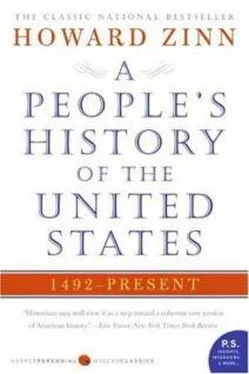Howard Zinn - A People
Здесь есть возможность читать онлайн «Howard Zinn - A People» весь текст электронной книги совершенно бесплатно (целиком полную версию без сокращений). В некоторых случаях можно слушать аудио, скачать через торрент в формате fb2 и присутствует краткое содержание. Издательство: Harper-Collins, Жанр: Фэнтези, на английском языке. Описание произведения, (предисловие) а так же отзывы посетителей доступны на портале библиотеки ЛибКат.
- Название:A People
- Автор:
- Издательство:Harper-Collins
- Жанр:
- Год:неизвестен
- ISBN:нет данных
- Рейтинг книги:4 / 5. Голосов: 1
-
Избранное:Добавить в избранное
- Отзывы:
-
Ваша оценка:
- 80
- 1
- 2
- 3
- 4
- 5
A People: краткое содержание, описание и аннотация
Предлагаем к чтению аннотацию, описание, краткое содержание или предисловие (зависит от того, что написал сам автор книги «A People»). Если вы не нашли необходимую информацию о книге — напишите в комментариях, мы постараемся отыскать её.
A People — читать онлайн бесплатно полную книгу (весь текст) целиком
Ниже представлен текст книги, разбитый по страницам. Система сохранения места последней прочитанной страницы, позволяет с удобством читать онлайн бесплатно книгу «A People», без необходимости каждый раз заново искать на чём Вы остановились. Поставьте закладку, и сможете в любой момент перейти на страницу, на которой закончили чтение.
Интервал:
Закладка:
Gary Nash's study of city tax lists shows that by the early 1770s, the top 5 percent of Boston 's taxpayers controlled 49 % of the city's taxable assets. In Philadelphia and New York too, wealth was more and more concentrated. Court-recorded wills showed that by 1750 the wealthiest people in the cities were leaving 20,000 pounds (equivalent to about $5 million today).
In Boston, the lower classes began to use the town meeting to vent their grievances. The governor of Massachusetts had written that in these town meetings "the meanest Inhabitants… by their constant Attendance there generally are the majority and outvote the Gentlemen, Merchants, Substantial Traders and all the better part of the Inhabitants."
What seems to have happened in Boston is that certain lawyers, editors, and merchants of the upper classes, but excluded from the ruling circles close to England-men like James Otis and Samuel Adams- organized a "Boston Caucus" and through their oratory and their writing "molded laboring- class opinion, called the 'mob' into action, and shaped its behaviour." This is Gary Nash's description of Otis, who, he says, "keenly aware of the declining fortunes and the resentment of ordinary townspeople, was mirroring as well as molding popular opinion."
We have here a forecast of the long history of American politics, the mobilization of lower-class energy by upper-class politicians, for their own purposes. This was not purely deception; it involved, in part, a genuine recognition of lower-class grievances, which helps to account for its effectiveness as a tactic over the centuries. As Nash puts it:
James Otis, Samuel Adams, Royall Lyler, Oxenbridge Thacher, and a host of other Bostonians, linked to the artisans and laborers through a network of neighborhood taverns, fire companies, and the Caucus, espoused a vision of politics that gave credence to laboring-class views and regarded as entirely legitimate the participation of artisans and even laborers in the political process.
In 1762, Otis, speaking against the conservative rulers of the Massachusetts colony represented by Thomas Hutchinson, gave an example of the kind of rhetoric that a lawyer could use in mobilizing city mechanics and artisans:
I am forced to get my living by the labour of my hand; and the sweat of my brow, as most of you are and obliged to go thro' good report and evil report, for bitter bread, earned under the frowns of some who have no natural or divine right to be above me, and entirely owe their grandeur and honor to grinding the faces of the poor…
Boston seems to have been full of class anger in those days. In 1763, in the Boston Gazette , someone wrote that "a few persons in power" were promoting political projects "for keeping the people poor in order to make them humble."
This accumulated sense of grievance against the rich in Boston may account for the explosiveness of mob action after the Stamp Act of 1765, Through this Act, the British were taxing the colonial population to pay for the French war, in which colonists had suffered to expand the British Empire. That summer, a shoemaker named Ebenezer Macintosh led a mob in destroying the house of a rich Boston merchant named Andrew Oliver. Two weeks later, the crowd turned to the home of Thomas Hutchinson, symbol of the rich elite who ruled the colonies in the name of England. They smashed up his house with axes, drank the wine in his wine cellar, and looted the house of its furniture and other objects. A report by colony officials to England said that this was part of a larger scheme in which the houses of fifteen rich people were to be destroyed, as pan of "a War of Plunder, of general levelling and taking away the Distinction of rich and poor."
It was one of those moments in which fury against the rich went further than leaders like Otis wanted. Could class hatred be focused against the pro-British elite, and deflected from the nationalist elite? In New York, that same year of the Boston house attacks, someone wrote to the New York Gazette, "Is it equitable that 99, rather 999, should suffer for the Extravagance or Grandeur of one, especially when it is considered that men frequently owe their Wealth to the impoverishment of their Neighbors?" The leaders of the Revolution would worry about keeping such sentiments within limits.
Mechanics were demanding political democracy in the colonial cities: open meetings of representative assemblies, public galleries in the legislative halls, and the publishing of roll-call votes, so that constituents could check on representatives. They wanted open-air meetings where the population could participate in making policy, more equitable taxes, price controls, and the election of mechanics and other ordinary people to government posts.
Especially in Philadelphia, according to Nash, the consciousness of the lower middle classes grew to the point where it must have caused some hard thinking, not just among the conservative Loyalists sympathetic to England, but even among leaders of the Revolution. "By mid-1776, laborers, artisans, and small tradesmen, employing extralegal measures when electoral politics failed, were in clear command in Philadelphia." Helped by some middle-class leaders (Thomas Paine, Thomas Young, and others), they "launched a full-scale attack on wealth and even on the right to acquire unlimited private property."
During elections for the 1776 convention to frame a constitution for Pennsylvania, a Privates Committee urged voters to oppose "great and overgrown rich men… they will be too apt to be framing distinctions in society." The Privates Committee drew up a bill of rights for the convention, including the statement that "an enormous proportion of property vested in a few individuals is dangerous to the rights, and destructive of the common happiness, of mankind; and therefore every free state hath a right by its laws to discourage the possession of such property."
In the countryside, where most people lived, there was a similar conflict of poor against rich, one which political leaders would use to mobilize the population against England, granting some benefits for the rebellious poor, and many more for themselves in the process. The tenant riots in New Jersey in the 1740s, the New York tenant uprisings of the 1750s and 1760s in the Hudson Valley, and the rebellion in northeastern New York that led to the carving of Vermont out of New York State were all more than sporadic rioting. They were long-lasting social movements, highly organized, involving the creation of countergovernments. They were aimed at a handful of rich landlords, but with the landlords far away, they often had to direct their anger against farmers who had leased the disputed land from the owners. (See Edward Countryman's pioneering work on rural rebellion.).
Just as the Jersey rebels had broken into jails to free their friends, rioters in the Hudson Valley rescued prisoners from the sheriff and one time took the sheriff himself as prisoner. The tenants were seen as "chiefly the dregs of the People," and the posse that the sheriff of Albany County led to Bennington in 1771 included the privileged top of the local power structure.
The land rioters saw their battle as poor against rich. A witness at a rebel leader's trial in New York in 1766 said that the farmers evicted by the landlords "had an equitable Tide but could not be defended in a Course of Law because they were poor and… poor men were always oppressed by the rich." Ethan Alien's Green Mountain rebels in Vermont described themselves as "a poor people… fatigued in settling a wilderness country," and their opponents as "a number of Attorneys and other gentlemen, with all their tackle of ornaments, and compliments, and French finesse."
Land-hungry farmers in the Hudson Valley turned to the British for support against the American landlords; the Green Mountain rebels did the same. But as the conflict with Britain intensified, the colonial leaders of the movement for independence, aware of the tendency of poor tenants to side with the British in their anger against the rich, adopted policies to win over people in the countryside.
Читать дальшеИнтервал:
Закладка:
Похожие книги на «A People»
Представляем Вашему вниманию похожие книги на «A People» списком для выбора. Мы отобрали схожую по названию и смыслу литературу в надежде предоставить читателям больше вариантов отыскать новые, интересные, ещё непрочитанные произведения.
Обсуждение, отзывы о книге «A People» и просто собственные мнения читателей. Оставьте ваши комментарии, напишите, что Вы думаете о произведении, его смысле или главных героях. Укажите что конкретно понравилось, а что нет, и почему Вы так считаете.












